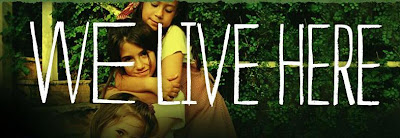We Live Here

 Zoe Kazan is an artist best known for her work as an actor, but this fall, Kazan is represented on the boards with a play she wrote. We Live Here, directed by the estimable Sam Gold and produced by Manhattan Theatre Club, checks in on the Bateman family in the days leading up to one of the daughter’s wedding. It represents a good effort in playwriting, but it’s not such a good play.
Zoe Kazan is an artist best known for her work as an actor, but this fall, Kazan is represented on the boards with a play she wrote. We Live Here, directed by the estimable Sam Gold and produced by Manhattan Theatre Club, checks in on the Bateman family in the days leading up to one of the daughter’s wedding. It represents a good effort in playwriting, but it’s not such a good play.The basic plot is familiar enough and, in a generic form, is already rife with dramatic intrigue, which makes some of Kazan’s plot points all the more eye-roll inducing. Allie Bateman (Jessica Collins), whose full first name is Althea, is getting married to Sandy (Jeremy Shamos). They’re at the Batemans‘ where mom Maggie (Amy Irving) and dad Lawrence (Mark Blum) are awaiting the arrival of their other daughter, Dinah (Betty Gilpin). The moment Dinah arrives, you know something’s up and that the sisterly relationship between her and Allie is not so great. But things really get shaken up when Daniel (Oscar Isaac) shows up at Dinah’s invitation. Daniel used to date Allie’s deceased twin sister, Andy, and is now, some 15 years later, dating Dinah, who is 11 years his junior.
Sound a little confusing? It can be. My friend who attended with me turned to me at intermission and said, “I’m confused.” We then spent the better part of intermission sorting through the tumultuous relationships. (Perhaps things would have been easier to understand if we had a better view of the full stage. John Lee Beatty's scenic design closed off far stages left and right to anyone sitting in far house left or right.)
The soap opera connections aside, my two biggest gripes with the play are that (1) where we ended up in the second act isn’t where it looked like we were headed in the first act; and (2) I could see the effort in the writing and structure.
The first act seemed to be building toward a showdown between the two sisters. This made sense to me, as everything I’d read about this play quoted Kazan as saying that this is a play about sisters. However, in the second act, the climax and by extension the juiciest dramatic action dealt with mother-daughter relationships, not sisterly ones. Moreover, the second act didn’t need to be a second act. The first scene was an unnecessary flashback, telling us nothing and developing the characters not a bit. We learn nothing in the flashback that isn’t spoken about in the second scene, set in present day. Had they cut the flashback, this could have been an intermission-less 90-minute(ish) play, and perhaps then the climax would have felt more natural.
I say that, but I’m actually not so sure, given all the other contrivances throughout the play. There were lots of discussions and plot points thrown in that felt like Kazan was shouting, “Watch, I can write dramatic stuff,” or, “Look how smart I am!” And other discussions or plot points were woven in so poorly that I couldn’t help but recognize them as devices, rather than story progression. (For example: Dad Lawrence discussing the Aristotelian concept of hamartia, a tragic hero. This overtly foreshadowed the showdown in the second act.)
 Trying to tackle the play is a game cast, though some excelled more than others. Amy Irving seemed to mistake volume for strength, and Jessica Collins’s Allie wasn’t particularly layered, but Jeremy Shamos (excellent in Clybourne Park and Animals Out of Paper) was likable as Sandy, bringing an ease, charm and sense of realness to a role that could have easily been caricature.
Trying to tackle the play is a game cast, though some excelled more than others. Amy Irving seemed to mistake volume for strength, and Jessica Collins’s Allie wasn’t particularly layered, but Jeremy Shamos (excellent in Clybourne Park and Animals Out of Paper) was likable as Sandy, bringing an ease, charm and sense of realness to a role that could have easily been caricature.Guiding the cast was in-demand director Sam Gold (Circle Mirror Transformation, The Aliens, et al.). Here, he once again shows off his knack for timing. There’s a moment when Allie is sitting on the couch and Dinah is about to go up the stairs. Instead of racing up those stairs, Gold has her linger over Allie’s shoulder for a moment, letting the relationship really sink in. It’s a small moment but it has a significant impact.
We Live Here is playing at Manhattan Theatre Club through November 6. Visit mtc-nyc.org for more information.
Comments
Post a Comment